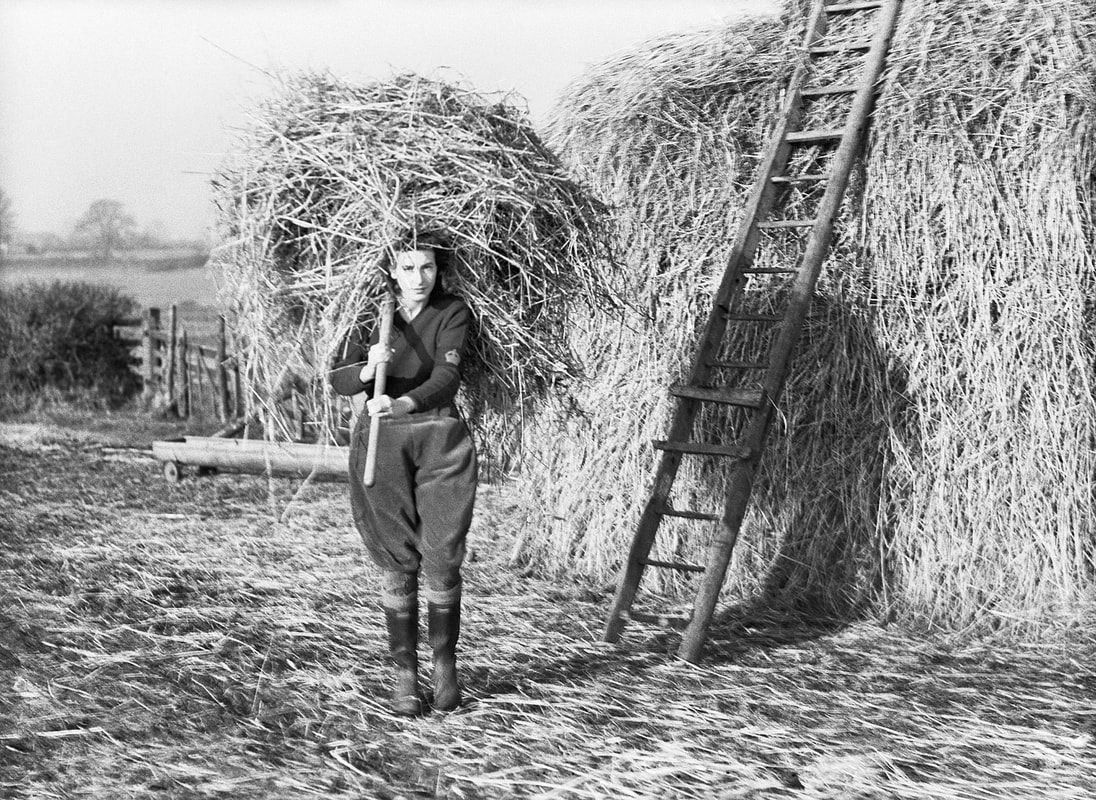|
Back to the Land, we must all lend a hand,
To the farms and the fields we must go, There's a job to be done, Though we can't fire a gun, We can still do our bit with the hoe.
The Women's Land Army was first established at the beginning of 1917. It was hoped that their assistance would help to increase food production in Britain and lead to less reliance on imports. With war looking more and more likely plans to re-establish the WLA began in 1938 and it was reformed in June 1939, three months before Britain declared war on Germany. It wasn't disbanded again until 1950.
At first it women could choose to voluneer, but in 1941 conscription for women was introduced for the very first time. Many of those who joined were from cities such as London were unprepared for the hardwork and long hours farming requires. By 1943 the number of 'land girls' reached its peak at over 80,000! Women were employed in many different jobs. Around a quarter worked in dairy production. Other jobs included that of anti-vermin control to kill badgers, foxes, rabbits and rats! In 1942 the Timber Corps was formed to help source and prepare wood. Around 6,000 women became 'Lumber Jills'. You can find out more here: BBC Archive of World War Two Memories BBC Photo Gallery: Land Army https://www.womenslandarmy.co.uk This coming weekend marks the 75th anniversary of VE Day and an opportunity to find out more about World War II and life in the 1940s. Perhaps you are a parent homeschooling for the first time, or maybe you'd like a way to open up conversations with your elderly relatives to get their perspective on the era they grew up in? Over the next few days I'll be sharing resources and information to give you the opportunity to find out more. What was VE Day? Victory in Europe Day is a day celebrating the formal acceptance by the Allies of World War II of Nazi Germany's unconditional surrender. At 3pm on 8th May 1945 the Prime Minister, Winston Churchill, announced on the radio that the war in Europe had officially ended. The nation was relieved that peace had come at last and there were big celebrations and street parties. So the Second World War was over? VE Day marked the end of the European part of the war, but did not mark the end of the Second World War, which continued in the East in Japan. This came on the 14th August 1945 after two atomic bombs were dropped on Japan, one in Hiroshima on the 6th August and another in Nagasaki on the 9th August. And the impact of the Second World War was felt for many more years. Millions had lost family and friends. Much of the country needed to be rebuilt, especially cities that had been heavily bombed during air raids. And rationing continued until 1954. You can listen to the BBC Broadcasts here: www.bbc.com/historyofthebbc/anniversaries/may/ve-day-broadcasts |
AuthorAn adventure loving historian with a soft spot for armour and motorbikes. Archives
May 2020
Categories
All
|


 RSS Feed
RSS Feed